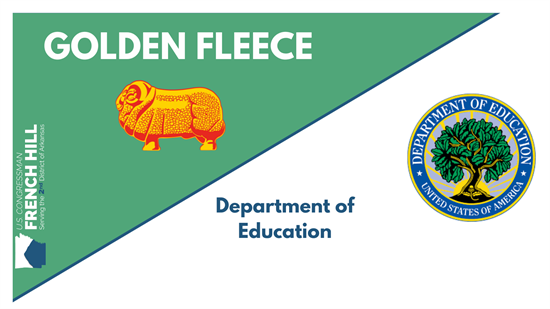RELEASE: REP. HILL AWARDS GOLDEN FLEECE TO DEPARTMENT OF EDUCATION FOR RECKLESS STUDENT LOAN FORGIVENESS ATTEMPTS
WASHINGTON, D.C.,
October 26, 2023
WASHINGTON, D.C. – Rep. French Hill (AR-02) named the Department of Education (ED) as the latest recipient of his Golden Fleece Award for supporting and promoting fiscally irresponsible policies, like debt forgiveness, related to the federal government’s student loan programs.
Rep. Hill said, “The Department of Education has long over-extended the moratorium on student loan repayments, peddled out policies to try to forgive debt for all borrowers with Department of Education loans, and is now trying to undermine the current income-driven repayment structure. For their preposterous and extravagant approaches to reining in the costs of higher education, I am naming the Department of Education as the latest recipient of my Golden Fleece Award.”
In a letter to ED Secretary Miguel Cardona, Rep. Hill writes:
Dear Secretary Cardona:
I write today to inform you that the U.S. Department of Education (ED) is the most recent recipient of my Golden Fleece Award. I am awarding this to ED for supporting and promoting expensive policies related to our student loan programs. Specifically, ED is receiving my Golden Fleece Award for repeated extensions of the loan payment moratorium, the Administration’s overturned policy to blindly forgive student loan amounts, the income-driven-repayment (IDR) scheme, known as the SAVE plan, and more.
The moratorium on student loan repayments began in March 2020 when the COVID-19 pandemic was declared as a national emergency. Shortly after, Congress included the payment suspension in the Coronavirus Aid, Relief and Economic Security (CARES) Act to extend it until the end of September 2020. President Trump then extended the moratorium twice until the end of January 2021. When President Biden came into office, he extended the policy six more times, most recently until the end of June 2023 with payments restarting in October 2023. In the view of my constituents, the COVID-19 pandemic ended much earlier, with President Biden even stating that “the pandemic is over” in September 2022.
Yet, your department ensured that the pause on student loan repayments remained for a whole additional year. The Committee for a Responsible Federal Budget has estimated that the repayment pauses cost over $5 billion per month and that the total cost of the pause is likely to have exceeded $195 billion.
If upheld, this policy would have resulted in the cancellation of $430 billion in federal student loan balances, from the $1.6 trillion that was held in all federal student loans at the end of June 2022.
In August 2023, the Biden Administration announced a new IDR plan, the Saving on a Valuable Education (SAVE) plan, to replace the Revised Pay-As-You-Earn (REPAYE) IDR plan and forgive outstanding student loan balances after 20 or 25 years of payments. If implemented, the SAVE plan would cut payments on undergraduate loans from 10% to 5% of a borrower’s discretionary income, redefine discretionary income as the difference between a borrower’s adjusted gross income and 225% of the U.S. Department of Health and Human Services Poverty Guideline, and provide early forgiveness for low-balance borrowers. Specifically, the change to the discretionary income level means that borrowers earning less than $30,000 a year would receive credit for paying $0 per month. A budget model produced by the Wharton School of the University of Pennsylvania analyzed this plan and estimated that it would cost taxpayers about $475 billion over the next 10 years. This report accounts for both payment reductions on outstanding loans and future loans, and it estimates that about 5% of all loans and 6.5% of future borrowers will never make any payments under this plan.
Most recently, this month, President Biden announced an additional $9 billion in debt relief for 125,000 Americans, of the 43 million borrowers. This debt relief is intended for some borrowers that are a part of the Public Service Loan Forgiveness (PSLF) program, borrowers “who are eligible for forgiveness through income-driven repayment by fixing historical inaccuracies in the count of payments”, and borrowers who have a total or permanent disability.
All of these policies amount to $1.1 trillion dollars in enacted or proposed costs to the taxpayers. It is my view that ED was never meant to hold so many outstanding loan balances, and I believe that forgiving these loans will only exacerbate problems with the costs of higher education. Further, none of these policies consider ways to address the root causes of higher education becoming more expensive and unaffordable, like reining in rising attendance costs or addressing poor student outcomes. Moreover, the lack of guidance around the SAVE plan and recent relief announcement, coupled with the restart of student loan repayments, has left many borrowers confused.
I am committed to ensuring effective fiscal practices at our Nation’s federal agencies. Should you require any additional authority from Congress to address these concerns, I urge you to notify us as soon as possible. I would also welcome any technical assistance you could provide to Congress to correct statutory issues that may have contributed to this problem. Thank you for your consideration and I look forward to working with you to address this important issue.
|


